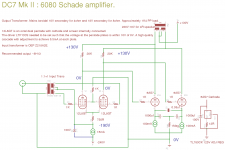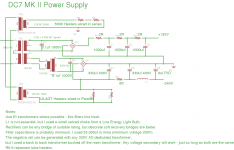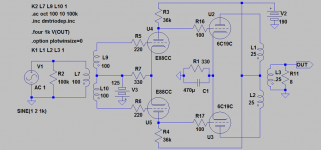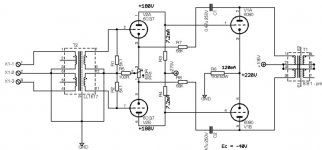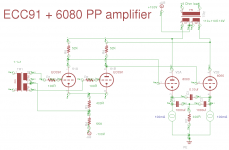Do you mean 6S19P probably?
Yepp! Checked the curves(russian sheet) and they look quite linear compared to other lowRi tubes like 6080. Have you checked the characterics IRL?
Tinitus,
Why complicate things more than needed? No need for input splitting-choke or CCS in the output stage. Use KISS (Keep It Simple , Stupid)😉!
Why complicate things more than needed? No need for input splitting-choke or CCS in the output stage. Use KISS (Keep It Simple , Stupid)😉!
Interstage transformers are horribly expensive so why not dump them and use an input transformer. With a decent low Z preamp you can use a 600ohm line transformer with great results.
If you are interested I can post my 6080 amp to show what I mean.
Shoog
If you are interested I can post my 6080 amp to show what I mean.
Shoog
Hey Shoog,
If we are talking high quality transformers the prices are actually on par. A LL1674 costs 104EUR and a LL1660 costs 104EUR.
If using a LL1676 there will be no problems impedance-wise with any source.
Using an input transformer opens up another possibility as one can use DC-coupling between driver and output tube. Didn´t you use it?
Tinitus,
To get reasonable sensitivity with a double-triode, E88CC comes to mind.
If we are talking high quality transformers the prices are actually on par. A LL1674 costs 104EUR and a LL1660 costs 104EUR.
If using a LL1676 there will be no problems impedance-wise with any source.
Using an input transformer opens up another possibility as one can use DC-coupling between driver and output tube. Didn´t you use it?
Tinitus,
To get reasonable sensitivity with a double-triode, E88CC comes to mind.
Last edited:
Tinitus,
Why complicate things more than needed? No need for input splitting-choke or CCS in the output stage. Use KISS (Keep It Simple , Stupid)😉!
Yeah, I go wild sometimes, sorry

I will take anything with a KISS

Revintage,
I have used OEP 600Ohm line input transformers which are about €30.00 each. I can't notice any issues with them, though I haven't done any significant testing. This is definately the best amp sound wise that I have built.
As you said using an input transformer allows direct coupling, and in my case I used Schade feedback ala Gary Pimms Tabor. It is all surprisingly simple and elegant with quite a few built in refinements. I certainly don't think the OEP's do anything bad.
Shoog
I have used OEP 600Ohm line input transformers which are about €30.00 each. I can't notice any issues with them, though I haven't done any significant testing. This is definately the best amp sound wise that I have built.
As you said using an input transformer allows direct coupling, and in my case I used Schade feedback ala Gary Pimms Tabor. It is all surprisingly simple and elegant with quite a few built in refinements. I certainly don't think the OEP's do anything bad.
Shoog
hey, I dont mind a 100EUR trafo
and I wouldnt mind input trafos at the same cost either
at least they are good quality, and last forever
if it makes sense to use them, then Im prepared to do so
and we do have a possible working design, so nothing wasted
but I will stay away from 300EUR OPTs
Lundahls low ohm OPTs are made for big tubes, and high power, thus expencive
Fortunately Edcor have a few smaller options
Power trafos need not be expencive either
and being a fairly simple design the remaining parts are within reason
Instead of heavy chokes I will consider to use one or two of Broskies power supply kits
at least on input/driver stage
havent decided which one yet
and I already have two of his heater supply kits
they will be mono designs
having passive att on input might be an option
btw
wavebourne, yes I think 6S19P is the same
maybe its to do with quality, or they have been relabelled
could it be related with previous russian export restrictions ?
Im pretty sure the original is 6C19N
and I wouldnt mind input trafos at the same cost either
at least they are good quality, and last forever
if it makes sense to use them, then Im prepared to do so
and we do have a possible working design, so nothing wasted
but I will stay away from 300EUR OPTs
Lundahls low ohm OPTs are made for big tubes, and high power, thus expencive
Fortunately Edcor have a few smaller options
Power trafos need not be expencive either
and being a fairly simple design the remaining parts are within reason
Instead of heavy chokes I will consider to use one or two of Broskies power supply kits
at least on input/driver stage
havent decided which one yet
and I already have two of his heater supply kits
they will be mono designs
having passive att on input might be an option
btw
wavebourne, yes I think 6S19P is the same
maybe its to do with quality, or they have been relabelled
could it be related with previous russian export restrictions ?
Im pretty sure the original is 6C19N
If you are interested I can post my 6080 amp to show what I mean.
Shoog
yes, please
Wavebourne may not see your post; if you check the Cyrillic alphabet you will find that C= S which means single triode, the letter "pi" is P which means miniature base either 9 pins or 7. There is no N as you write it in the Cyrillic alphabet only a letter which looks similar with the centre stroke going the other way; this is the "ee" sound and on a tube means for impulse operation. The only variation on 6C19"pi" is 6C19"pi"-B which is a mechanically more rugged version of this tube.
thats the one 
Thanks Lars, I wouldnt have come this far without your help
I have a question regarding linetrafo
LL1922 and LL1676 looks very alike, specced to a 600ohm source
Though, LL1676 has 10kohm out, and lower than LL1922 with 47kohm
is it the lower 10kohm out that makes it easier to drive, in respect to driver tube, and maybe also the lower 1:2 gain 😕
btw, LL1676 is top quality with amorph C-core 🙂

Thanks Lars, I wouldnt have come this far without your help

I have a question regarding linetrafo
LL1922 and LL1676 looks very alike, specced to a 600ohm source
Though, LL1676 has 10kohm out, and lower than LL1922 with 47kohm
is it the lower 10kohm out that makes it easier to drive, in respect to driver tube, and maybe also the lower 1:2 gain 😕
btw, LL1676 is top quality with amorph C-core 🙂
There is no N as you write it in the Cyrillic alphabet only a letter which looks similar with the centre stroke going the other way; this is the "ee" sound and on a tube means for impulse operation. The only variation on 6C19"pi" is 6C19"pi"-B which is a mechanically more rugged version of this tube.
you are right, small letter "n" looks a lot like the mathematical symbol for "pi", but could easily end up as capital letter "N", which appears to be wrong
6C19"pi" it is then, probably

what I meant was that if called 6S19, it must have been relabelled with western letters
while in production, I suppose this tube has never left Russia
letters CCCP clearly indicates that
Attachments
if you check the Cyrillic alphabet you will find that C= S which means single triode, the letter "pi" is P which means miniature base either 9 pins or 7.
Hey Piano3
Who cares? Everyone here knows what it is even if wrong spelled. And by the way this thread isn´t about spelling. Think Tinitus is more into alternative circuits😉🙂.
With respect revintage, the precise spelling on tubes of Russian/Soviet origin gives you a very good initial idea of their use, expected lifetime and even maybe microphony. I believe that tinitus has already said that he wants them to last a long time?Look carefully at the marvellous datasheet that Wavebourne has been good enough to post. I also feel, in an international spirit, that it does no harm to be familiar with the alphabet of a culture whose tubes and capacitors many of us enjoy the use of for their high quality,great variety and very affordable price.BTW, I am not Russian, I am from Belfast,Northern Ireland.
I believe that tinitus has already said that he wants them
Hey P3,
Just notice Tinitus does not want them, he already has them😉.
About longlasting this will probably not be an issue as long as he runs them in the ballpark of 50mA ,160-180V, 4-5k, where they are quite linear. Think this is close to what you also suggested.
About russian tubes in general they are my favourites in preamps. No idea I mention them as you would probaly pick on my spelling🙂.
Enough said about this, let´s concentrate on circuit-solutions as this was what Tinitus was interested in when he started this thread. Personally I leave it.
- Home
- Amplifiers
- Tubes / Valves
- ecc99 - 6C19n PP, (6S19P)
